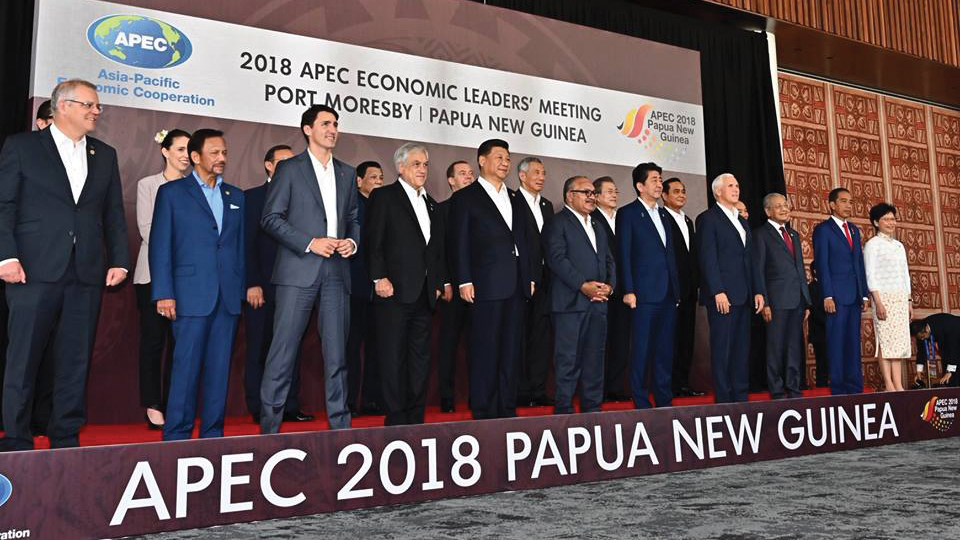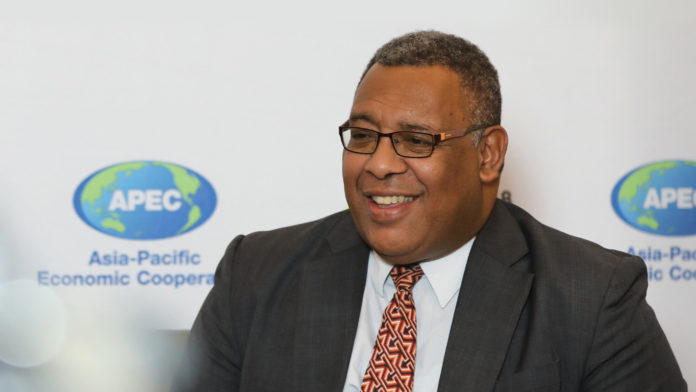When the eyes of the world were on Papua New Guinea during the 2018 Asia Pacific Economic Cooperation (APEC) summit, the man chairing the negotiation process decided to move away from the limelight to spend time with God.
Saturday, November 17, 2018, will go down as a memorable date for Ivan Pomaleu, 51, who, as APEC ambassador for Papua New Guinea that year, assisted in hosting the Port Moresby meetings of world leaders, including PNG prime minister Peter O’Neill, Chinese president Xi Jinping, Russian prime minister Dmitry Medvedev and Canadian prime minister Justin Trudeau.
But Pomaleu, a Seventh-day Adventist from Manus province, would not allow the disagreements of world superpowers China and the United States to come between him and his God. He chose to be in church that day.
Having led a team of dedicated Papua New Guineans over the past five years—planning, drawing up a hosting program, setting the agenda and physically preparing PNG to host the APEC meetings—he was adamant that the meetings would be run smoothly.
Consensus was the key word at APEC—everyone must agree—but consensus seemed to be missing among the 21 world leaders gathered in Port Moresby.
“Part of the outcome of the year was to deliver the APEC Ministerial Statement and the Leaders’ Declaration,” says Pomaleu, reflecting back on the experience. “The APEC Ministers’ Statement was about 10 pages. That was the single most difficult thing to do. We had to referee a geo-political fight between China and the US on trade matters. The work of building consensus on each of the 89 paragraphs was mine to lead.
“I knew November 17th would be a Sabbath—a day that the Bible tells me I should rest from my weekly work. That was when we were scheduled to bring all the parties together and make sure that we tied down the documents. Nothing was going to make me work on the 17th so I was pushing everybody hard to make sure we concluded on the 16th.
“About five days out, I knew we were going to run into problems because the Chinese were a mile off and the US were also a mile off—neither of these two countries would agree on the important paragraphs relating to trade, the World Trade Organisation and tariff reduction programs. They were not going to relent on those issues.”
With four paragraphs on the Leaders’ Declaration and four paragraphs on the Ministers’ Statement still outstanding, the leaders contemplated deleting them. However, that created disharmony with the other countries that still wanted those paragraphs.
“Late on Friday I convened a smaller group of diplomats to just work on proposing a wholesale rewrite of those four paragraphs so that it would demonstrate some compromise for everyone to look at and agree. I demanded that they reach a consensus by 10 on Friday night before I left that plenary and went home. I said, ‘I’m not talking to anyone until Saturday night. Sort yourselves out and I will come back and see what you have.’ That was a difficult one, but I was at peace.”
Pomaleu believes some people misread his motives and commitment, and even blamed him for the outcome of the meetings. “The fact that I was absent for that crucial day may have been read as the reason why we never got the statements endorsed. But a lot of people have also said it was a fight nobody could win in the end.
“It was Sabbath. I was at church, a sermon was preached and I remember being quite convinced that that message was intended for me.
“I went home, had a good afternoon, saw a lot of missed calls and text messages on my phone; I didn’t answer any of them. I had a good rest and closed the Sabbath with my family.”
In talking to his three children during this Sabbath day, Pomaleu said something he hopes was a “teaching moment” for them: “I told them, ‘If there is one thing I want you to learn from this, it is this: When the world came to Port Moresby, your daddy was at church.’ I told them that, for me, God was more important than the opportunity to meet world leaders and to be able to enhance my career because I was seen with important people. That, I felt in my bones. I know that I might have sacrificed something. I was unemployed after that.
“For whatever reason, what was supposed to be the highest point in my career turned out to be something other than that. But I’m happy I had a teaching moment for my children. I didn’t speak to anyone at APEC on that Sabbath, but I said a lot of things without saying anything. For me, that was important.”
For the first time in APEC history, the world leaders departed without being able to release an official Leaders’ Declaration, but Pomaleu is satisfied PNG did well as a host nation.

Humility and hard decisions
What gives a man such strength of character in the face of such strong political pressure? And how was such a committed, church-going family man able to rise to the world stage in this way? Pomaleu humbly attributes his strong faith in God to his upbringing. He pays tribute to his late father Job and mother Martha for imparting Christian principles in his young life before he set out to pursue his education and career. Job Pomaleu was just a simple farm worker, but he believed in education. Young Ivan was encouraged in his studies and, as a boarding student, successfully completed his six years of high school at Kabiufa Adventist High School on the outskirts of Goroka in 1981. Living away from home and family was a struggle sometimes, but, Pomaleu says, “I am thankful. I suffered a little bit, but what I didn’t know was that it obviously strengthened my outlook in life to tough it out in certain circumstances.
“In hindsight, it helped me a lot in later life, particularly life that required me to interact with important people who are not Papua New Guineans—I think the church provided that.”
Pomaleu is also thankful for having crossed paths with students from Solomon Islands and Vanuatu during his studies at Sonoma Adventist College and also the Fijians who visited on short courses. These encounters built his dreams of one day stepping out of his national boundaries to explore the world.
After graduating from the University of PNG with a science degree, Pomaleu turned down a possible pest control job from Ramu Sugar due to his commitment to Sabbath—the job required working seven days. Instead he began his career with the Department of Finance and Planning. But in 1996, he quit from that department as one of his tasks was against his Christian principles.
“A particular part of my job involved dispensing electoral development funds to political leaders. My boss set the priority and I processed the request. It became difficult for me to continue that work as I may have knowingly facilitated payments to the wrong hands and, based on those guidelines at that time, it was quite a discomfort for me to continue with the work knowing that we may be doing some wrong things.
“So I actively started looking for other opportunities. At every turn of my life, there were certain important decisions that I made that were governed by my Christian upbringing.”
Just two years after beginning a new job with the Investment Promotion Authority, Pomaleu was asked to be the acting managing director. The managing director was never reinstated.
“I always reflect on those important turns that the unseen hand of God had purposely placed me in to learn the ropes,” he says. “At the ripe old age of 31, I had to deal with the leadership of an organisation that had about 90 staff. A number of my colleagues resigned because they couldn’t handle taking orders from a younger director.
“One of the earliest jobs I did was rewrite systems and procedures, institute accounting protocols and deal with human resources. Fast forward 15 years later; I left in 2016 and one of my symbolic last acts was to write a K3 million cheque to a fixed term deposit account because we could pay ourselves; no longer did we need to rely on government funding.”
In 2013 Pomaleu was asked to be APEC senior official for PNG, a wholly separate job that reported to the prime minister.
“For five years of my time, I did two jobs for one pay-cheque. APEC was an interesting thing. I didn’t pursue it; I didn’t ask for it. It was basically picked up and left on my lap.”
Amid his busy schedules and challenges, he drew his strength from God. He recalls one of those moments when God answered his prayer.
“It was during the informal senior officials meeting on December 6, 2017. I walked into my office at one of the city hotels, closed the door and told one of my officers that I just wanted to pray for the team. I said, ‘Lord we are going into battle. We are like Davids. We have Goliaths who are going to be in the room. Just allow us to survive.’
“We more than survived. That prayer was important. We walked out of the room nervous, but we took our place at the head of the table and did our best.”
Jacqueline Wari is a journalist with experience in PNG’s national media. She now works with the Seventh-day Adventist Church’s communication team in Lae.






